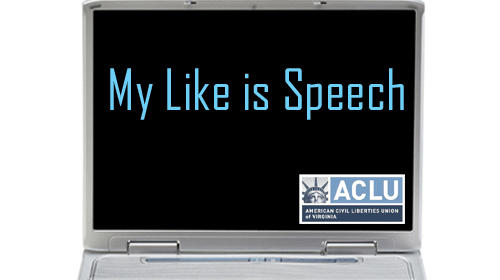
Last night, the ACLU filed a friend-of-the-court brief in an appeal of a federal judge’s ruling in May that “liking” something on Facebook is not speech protected by the First Amendment. In the case, now before the U.S. Court of Appeals for the Fourth Circuit, employees of a Virginia sheriff who was running for reelection were fired for “liking” the sheriff’s opponent’s webpage on Facebook and taking other actions to indicate their support for the opponent. Those employees brought a First Amendment lawsuit against the sheriff, B.H. Roberts, who fired them after he won the election.
Facebook also filed its own friend-of-the-court brief yesterday.
The district court judge ruled that “liking” something isn’t protected because it is limited to simply clicking one button on Facebook. But as the ACLU argues in our brief,
With “one click of a button,” an Internet user can upload or view a video, donate money to a campaign, forward an email, sign a petition, send a pre-written letter to a politician, or do a myriad of other indisputably expressive activities. The ease of these actions does not negate their expressive nature. Indeed, under the district court’s reasoning, affixing a bumper sticker to your car, pinning a campaign pin to your shirt, or placing a sign on your lawn would be devoid of meaning absent further information, and therefore not entitled to constitutional protection because of the minimal effort these actions require. All of these acts are, of course, constitutionally protected…
That many people today choose to convey what they like or which political candidates they support by “Liking” a Web page rather than by writing the actual words, “I like this Web page” or “I like this candidate,” is immaterial. Whether someone presses a “Like” button to express those thoughts or presses the buttons on a keyboard to write out those words, the end result is the same: one is telling the world about one’s personal beliefs, interests, and opinions. That is exactly what the First Amendment protects, however that information is conveyed.
As ACLU staff attorney Aden Fine said,
Facebook should be applauded for filing this brief to support the free speech rights of its users. The Supreme Court has made clear that the First Amendment protects everyone’s right to express their thoughts and opinions in whatever form they choose to do so. Facebook has become a means of communication for tens of millions of Americans, and if basic activity on Facebook such as “liking” were denied First Amendment protection, the free expression of ideas that the First Amendment is meant to safeguard would be severely limited.
This case is an important reminder of how the law needs to keep pace with technology, and we are hopeful that the appeals court will affirm that the First Amendment protects everyone’s right to speak freely on the Internet.
Learn more about freedom of expression: Sign up for breaking news alerts, follow us on Twitter, and like us on Facebook.


